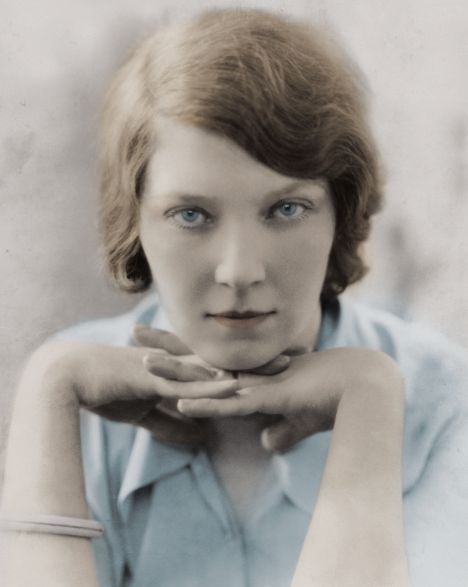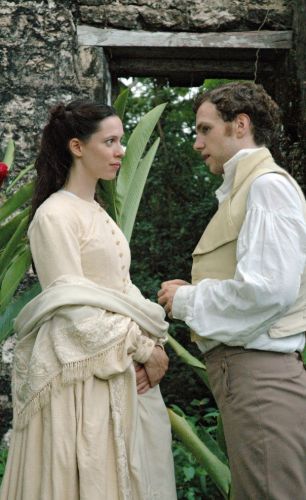Friday, May 8, 2009
Beach, burlesque, booze, brilliance
THE BLUE HOUR: A PORTRAIT OF JEAN RHYS BY LILIAN PIZZICHINI (Bloomsbury £16.99)
By Val Hennessy
Had she been alive today Jean Rhys (1890-1976) would certainly have been diagnosed with a personality disorder. Or as hovering on the very edge of the Asperger's spectrum. Poor woman.
As Lilian Pizzichini's excellent biography makes clear, Rhys, author of such troubling novels as Quartet, Good Morning, Midnight and the radiantly brilliant Wide Sargasso Sea, was an absolute nightmare. And, of course, such a volatile personality is God's gift to a biographer.
She was born Gwendolyn Williams on the Caribbean island of Dominica. A descendent of a wealthy slave-owner, Rhys was a privileged white Creole girl - a notch below pure whites, but resented and envied by black locals who called her 'White Cockroach'.
Her black nanny filled her head with tales of zombies and vampires, and Rhys spent much of her childhood screaming, sobbing and taking to her bed.
A spell at Catholic boarding school, where she wrote gloomy poems
She longed to escape from the drenching heat, brooding mountains, lush vegetation and stultifying community. So, with her imagination full of jolly characters from Dickens, log fires, snow, bejewelled Edwardian mistresses and elegant society shindigs, she left Dominica for England.
Big mistake. Chaperoned by an aunt and stuck in a dreary Bloomsbury boarding house, 18-year-old Rhys was freezing cold, bored and disenchanted by London's smoggy melancholy.
Rhys's aunt, exasperated by this ungrateful, self-absorbed girl who ignored all efforts to please her, declared: 'You are incapable of thinking about anyone but yourself.' Which, in fact, remained a permanent facet of Rhys's character.
Pizzichini asserts that 'in England she lost her sense of oneness with the colours of the world' and that she was 'crippled and constrained by English society and its rules,out of her element'.
Fast-forward and the restraint soon dissolved when Rhys became a burlesque dancer, touring the provinces, staying in seedy lodgings and prowling for chaps who'd swap her favours for fancy meals and gifts.
At 20 she was a 'kept woman', installed in a love nest by her rich lover Lancey, who skedaddled after two years, broke her heart and offered her a generous allowance on condition she left him alone. He supported her financially for years.
By now, the abandoned Rhys was hitting the bottle. As Pizzichini says: 'All her certainties, that love lasted for ever, that she was beloved, had fallen away.' She went off the rails, worked as a prostitute and had Lancey cough up for an abortion and a new flat.
The lamps were going out all over Europe, but Rhys didn't notice world events - she became an artist's model and, fuelled by booze, began to write.
She lived a vagabond life, with three eventual marriages and a multitude of temporary homes in Paris, Amsterdam, Vienna, Budapest.
A baby boy was deposited at a hospice for poor children, where he died. A baby daughter was left in a clinic and with various carers, while Rhys, drunk and downand-out, frequented the bars of Montparnasse.
By 1941, she was in Norfolk spending some time in an asylum. Having produced five not-very-well-received books, she stopped writing. About one book, a critic had warned readers: 'You will be at the suicide point long before you close it.' People admired her prose, but not her hopeless heroines and depressing plots. As Pizzichini explains: Rhys 'writes about loss, fear of loss, never being able to recover from loss', which, during the war years, didn't appeal to readers wanting cheerful, escapist novels.
How she managed to write Wide Sargasso Sea (the Jane Eyre prequel about the first MrsRochester) is one of the great literary mysteries of our time. Pizzichini describes the original draft as being 'stained with grief, sweat and face powder' - as well as splashes of whisky, we must assume, as by now Rhys was getting through at least a bottle a day.
Yet just when she had hit rock bottom, she was rescued from obscurity by a BBC producer who set the septuagenarian hell-raiser on the road to literary celebrity.
As you can deduce, this is a good, gripping, action-packed biography. Pizzichini bends over backwards to sympathise with, and account for, Rhys's grotesque behaviour.
She admires her way of hoarding her psychological pain and recycling it into high-status literature. She skilfully pinpoints the parallels between the life and the fiction, and leaves you eager to hunt out Rhys's now-acclaimed collected works.
By Val Hennessy
Had she been alive today Jean Rhys (1890-1976) would certainly have been diagnosed with a personality disorder. Or as hovering on the very edge of the Asperger's spectrum. Poor woman.
 Jean Rhys. |
She was born Gwendolyn Williams on the Caribbean island of Dominica. A descendent of a wealthy slave-owner, Rhys was a privileged white Creole girl - a notch below pure whites, but resented and envied by black locals who called her 'White Cockroach'.
Her black nanny filled her head with tales of zombies and vampires, and Rhys spent much of her childhood screaming, sobbing and taking to her bed.
A spell at Catholic boarding school, where she wrote gloomy poems
She longed to escape from the drenching heat, brooding mountains, lush vegetation and stultifying community. So, with her imagination full of jolly characters from Dickens, log fires, snow, bejewelled Edwardian mistresses and elegant society shindigs, she left Dominica for England.
Big mistake. Chaperoned by an aunt and stuck in a dreary Bloomsbury boarding house, 18-year-old Rhys was freezing cold, bored and disenchanted by London's smoggy melancholy.
Rhys's aunt, exasperated by this ungrateful, self-absorbed girl who ignored all efforts to please her, declared: 'You are incapable of thinking about anyone but yourself.' Which, in fact, remained a permanent facet of Rhys's character.
 The recent BBC4 adaptation of The Wide Sargasso Sea starring Rebecca Hall and Rafe Spall. |
Pizzichini asserts that 'in England she lost her sense of oneness with the colours of the world' and that she was 'crippled and constrained by English society and its rules,out of her element'.
Fast-forward and the restraint soon dissolved when Rhys became a burlesque dancer, touring the provinces, staying in seedy lodgings and prowling for chaps who'd swap her favours for fancy meals and gifts.
At 20 she was a 'kept woman', installed in a love nest by her rich lover Lancey, who skedaddled after two years, broke her heart and offered her a generous allowance on condition she left him alone. He supported her financially for years.
By now, the abandoned Rhys was hitting the bottle. As Pizzichini says: 'All her certainties, that love lasted for ever, that she was beloved, had fallen away.' She went off the rails, worked as a prostitute and had Lancey cough up for an abortion and a new flat.
The lamps were going out all over Europe, but Rhys didn't notice world events - she became an artist's model and, fuelled by booze, began to write.
She lived a vagabond life, with three eventual marriages and a multitude of temporary homes in Paris, Amsterdam, Vienna, Budapest.
A baby boy was deposited at a hospice for poor children, where he died. A baby daughter was left in a clinic and with various carers, while Rhys, drunk and downand-out, frequented the bars of Montparnasse.
By 1941, she was in Norfolk spending some time in an asylum. Having produced five not-very-well-received books, she stopped writing. About one book, a critic had warned readers: 'You will be at the suicide point long before you close it.' People admired her prose, but not her hopeless heroines and depressing plots. As Pizzichini explains: Rhys 'writes about loss, fear of loss, never being able to recover from loss', which, during the war years, didn't appeal to readers wanting cheerful, escapist novels.
How she managed to write Wide Sargasso Sea (the Jane Eyre prequel about the first MrsRochester) is one of the great literary mysteries of our time. Pizzichini describes the original draft as being 'stained with grief, sweat and face powder' - as well as splashes of whisky, we must assume, as by now Rhys was getting through at least a bottle a day.
Yet just when she had hit rock bottom, she was rescued from obscurity by a BBC producer who set the septuagenarian hell-raiser on the road to literary celebrity.
As you can deduce, this is a good, gripping, action-packed biography. Pizzichini bends over backwards to sympathise with, and account for, Rhys's grotesque behaviour.
She admires her way of hoarding her psychological pain and recycling it into high-status literature. She skilfully pinpoints the parallels between the life and the fiction, and leaves you eager to hunt out Rhys's now-acclaimed collected works.
| | Home Page | Dominica |Welcome Message | Prior Issues|Flag and Symbols | Dominica Constitution | Bulletin Board |Contact Us |Local Headlines |Discussion Board |Radio & TV |Cricket | Current Issue |
Subscribe to Posts [Atom]
Post a Comment
Please Provide Opinions and Comments on This Article.